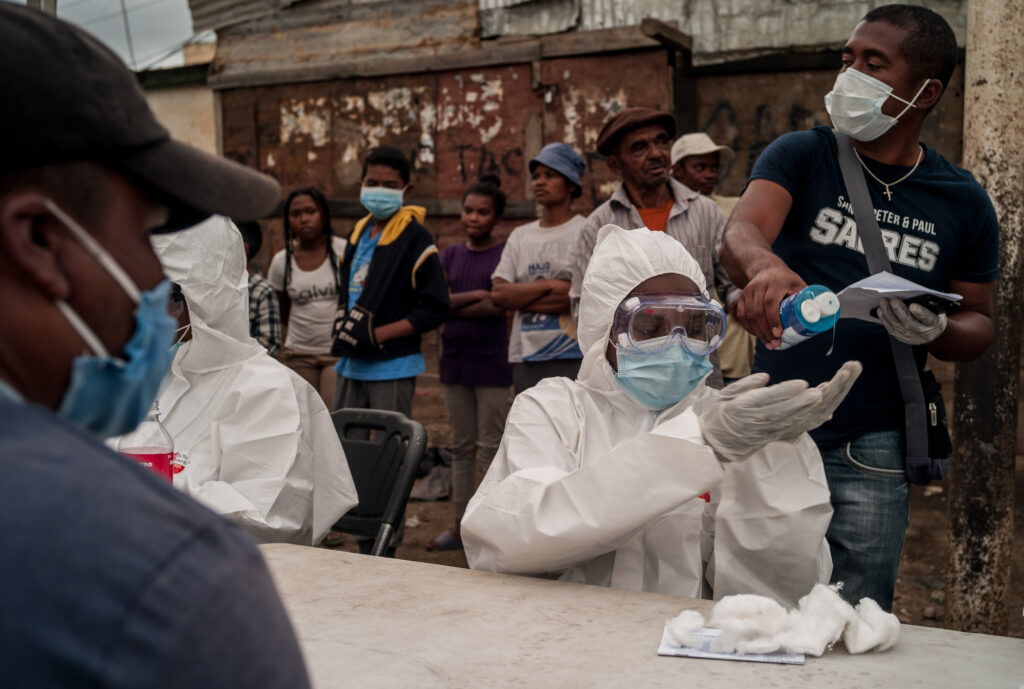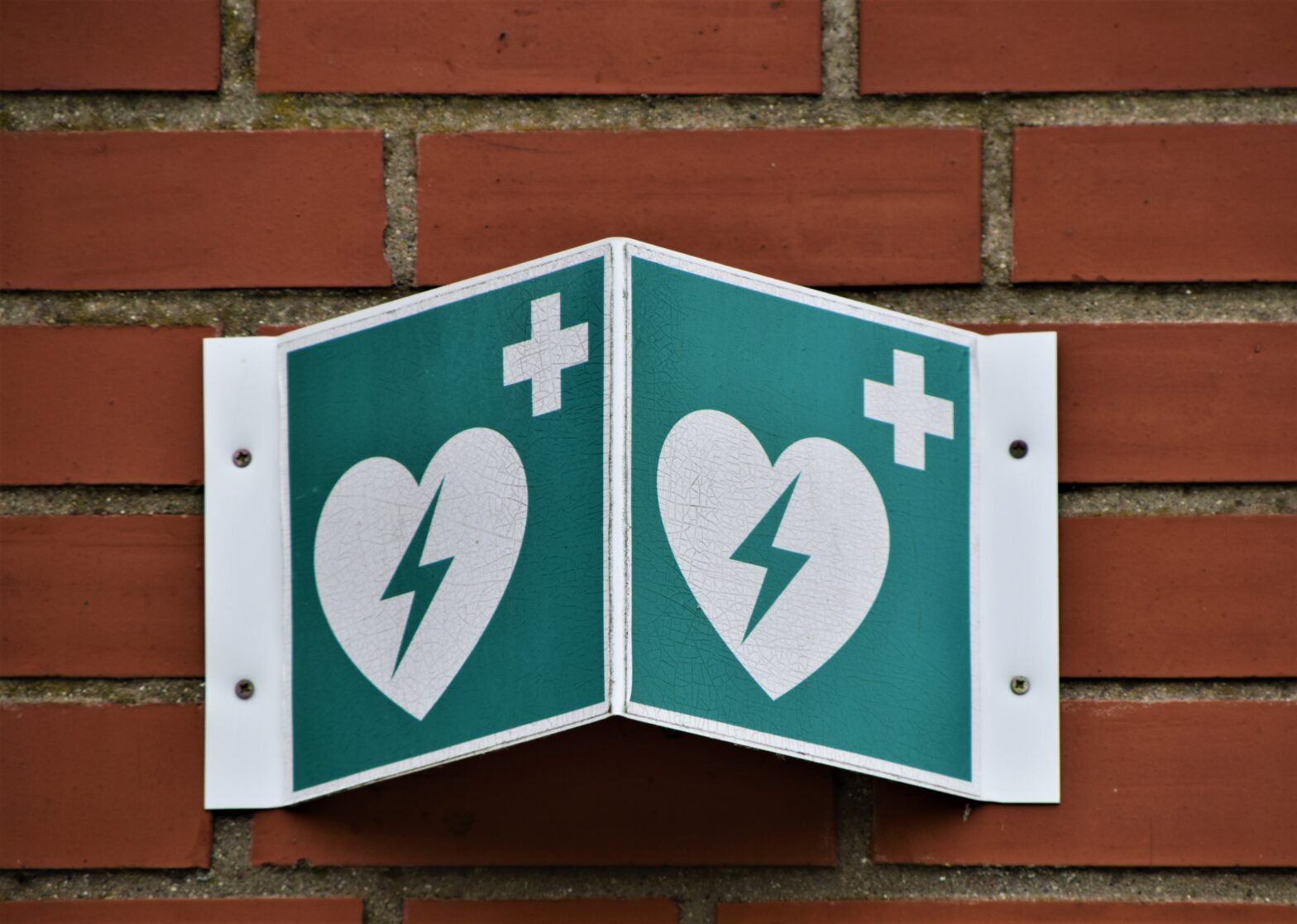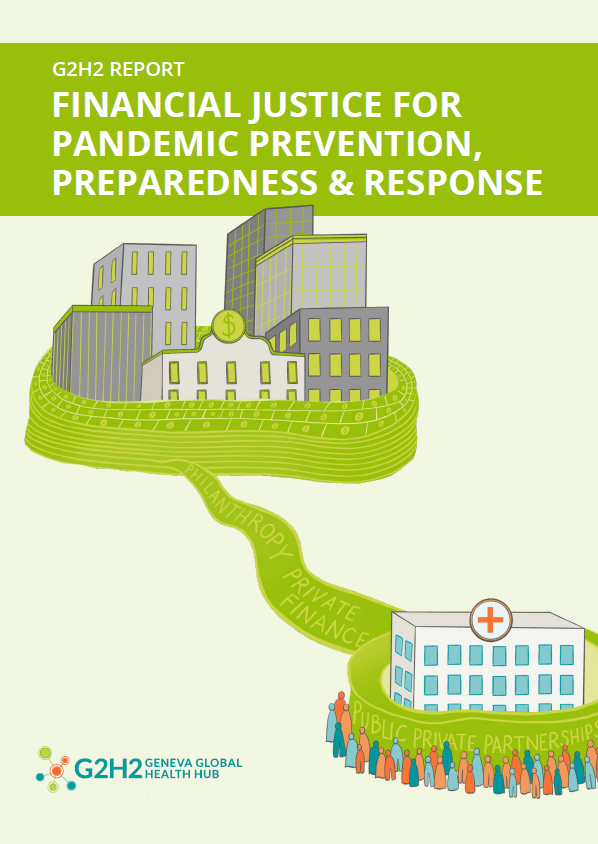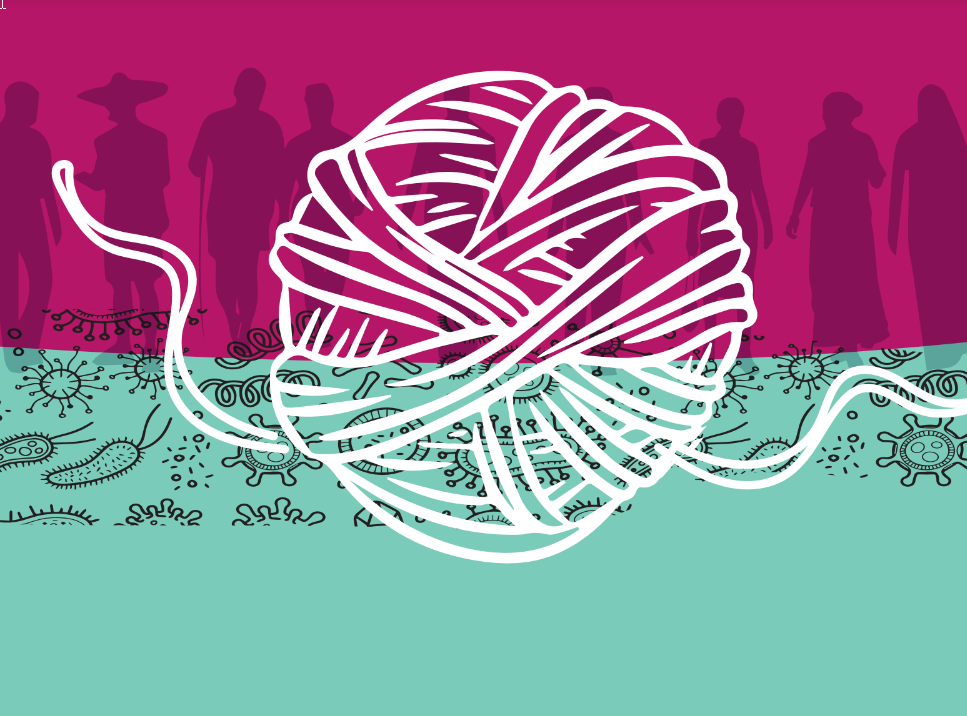Share Twitter Facebook Email Copy URL
Eva Wuchold and Jan van Aken on the social dimension of health and sickness
In early 2021, the Rosa Luxemburg Foundation started a new project on global health issues. The foundation has worked on the topic in Germany for several years now, especially on struggles and strikes in hospitals (and other areas of health care), on the critique of economization and profit orientation in the health sector, on questions of needs-oriented planning and regulatory competences at the state level, as well as on the demand for resocialization and the transfer of private clinics back to the public sector, or on the digitalization of health services. Since COVID-19 at the latest, it became clear that we should also take a more global look at health equity.
The project is based in the foundation’s Geneva Office, within sight of the WHO, where global issues such as the growing influence of philanthrocapitalists like Bill Gates are being tackled. Since its foundation, the Geneva Office has cultivated a central focus on the work for global social rights. To learn more about the project and the ideas behind it, Kathrin Gerlof spoke with Eva Wuchold of the Geneva Office and Jan van Aken, one of the project’s coordinators.
What we have to become aware of is the social dimension that is so integral to the issue of health. Why has this link between mental and bodily health and the conditions of life, which was clearly present in the social struggles of the 20th century, slipped from view?
JvA: The realization that social conditions have a lot to do with health is of course older. It was already there in the nineteenth century. Epidemics in particular taught people that poverty has a lot to do with illness and often leads to it. This realization flared up powerfully in the 1960s, when everything was viewed as political, including the private sphere. Health was considered in more political terms.
In Germany, the Armut und Gesundheit (Poverty and Health) conference still takes place every year. So the issue is there. The big question is: why is the broader population not aware of it? I believe that it has something to do with capitalism. The entire health industry here in Germany, in Europe, and worldwide is based on commercial products. But you can’t sell changes in social conditions. You can’t sell better hygiene. The focus is on new products and services that can be transformed into money.
That, for us, is where health begins and ends. Poverty has no place in that. It was interesting to see how it became clear during the COVID-19 pandemic in New York that the fatality rates were much higher in poorer parts of the city, but that it took quite a long time for the links to be made. Poorer living and working conditions, more poverty—but at the beginning people still believed that it might have had to do with a genetic disposition. Many scientists simply ignored social conditions. That’s crazy.
EW: As Jan said, studies have for a long time confirmed the influence of social status on health and life expectancy. That’s why international organizations like the World Health Organization (WHO) and the International Labour Organization (ILO) have said that the dismantling of health inequalities—both between and within countries—that correspond to social determinants has to be a primary goal. The expression “social determinants of health” refers to non-medical factors that influence health outcomes. They include the conditions under which people are born, grow up, work, live, and age, as well as the broad spectrum of forces and systems that shape all of the conditions of daily life.
The WHO already described the dramatically different life chances of people according to where they were born in 2008, in its report, Closing the Gap in a Generation: Health Equity Through Action on the Social Determinants of Health. In countries of all income levels, health and sickness follow a social gradient; the lower you go down the socio-economic scale, the worse people’s health gets.
From that point of view, the solution to the problem is obvious: undoing material and social inequalities is a way to overcome health inequalities. If this has slipped from view for social movements in recent decades, this may also have to do with the fact that the condition of healthcare systems around the world is very uneven, and that the stakes of the social struggle vary accordingly. In some regions, the goal is the establishment of basic systems of health care provision, in others it is the introduction of public health insurance, and in yet others it is the privatization of public health care institutions that is at stake.

People around the world pray for health or wish for it as if it were a gift or a question of luck. The social dimension of health is not strongly anchored in people’s awareness. What is this social dimension?
EW: Despite numerous scientific studies, the scholarly interest in this issue remains marginal and inadequate. Perhaps one reason why it is so difficult to point to the social dimension of health is the lack of a clear definition of poverty. In general, distinctions are drawn between absolute poverty, which threatens people’s physical existence, and relative poverty. Attempts to define relative poverty in industrialized countries mostly make reference to people’s financial resources (income poverty).
However, the formal reference to income does not adequately reflect the complexity of this social status. Poverty is a multi-dimensional phenomenon in the sense that it involves a number of states of deprivation, including in the areas of housing, education, work, working conditions, income, and the provision of technical and social infrastructure. Accordingly, the social dimension of health is complex.
JvA: My understanding of this concept is, to begin with, that it is social conditions that make a person healthy or sick. That is true even when we presuppose a classical concept of health: I am not in pain, I don’t have a fever, I feel healthy. The social dimension poses the question of which conditions are responsible for illness. The WHO tells us: social injustice kills on a massive scale.
The neoliberal interpretation makes things easy for itself: the human being is free. Accordingly, they are also responsible for taking care of their health. Ultimately, the idea is to make the area of social responsibility as small as possible and that of individual responsibility as large as possible. And the aim is to transfer the task of reproducing their labour power, which generates surplus value, onto the individual. But if we speak of the social dimension of health, we have to speak of social responsibility. What does that consist of?
JvA: What do we think makes people healthy? At the moment many people would respond by, for instance, reiterating their faith in medical products, which the pharmaceutical and health care industries offer. Services that are for sale. And everything else is discarded. Social responsibility consists, to begin with, of posing the question of where sickness comes from. Obesity, for example, has to do with poor nutrition, with incredible amounts of sugar and fat in fast food, which is consumed above all by people in lower social strata, but makes people sick.
So if you want to do something for health on a global scale, you need to begin with issues like that. Banning certain kinds of food that make people sick, for example, or at least upper limits on sugar, fat, and other poisons. But that’s hardly possible today, since it completely contradicts the interests of the capitalist system.
A socially meaningful health policy would always inquire into the causes of illness, remove the causes that it’s possible to eradicate. Yet the question is never posed in that way, because the answers would shake capitalism to its foundations. Poorer people would suddenly have to live in better apartments, and for that better wages would be necessary, reducing profits. You don’t have to follow the chain very far.
EW: For me there’s no doubt that health is a public good. But unfortunately, Jan is right: even though the knowledge that we’ve accumulated globally about health has never been more extensive, this knowledge clearly comes into conflict with specific powerful economic interests. And that’s precisely what’s wrong with the health system today. Over the last few decades it has been decoupled, bit by bit, from an economy oriented towards the common good and subjected to the principle of capitalist competition. But it’s part of the essence of capitalism that it systematically produces poverty, not just wealth.
Since growth ended in the 1970s, the valorization of capital has increasingly been based on the expropriation of common goods. Increasingly, what the World Bank and the International Monetary Fund laid down for the countries of the Global South, namely the dismantling of social infrastructure, has been called for in a similar way by business advisers in relation to health care institutions in the countries of the North.
Prior to the COVID-19 pandemic, there were few who were continuing the discourse around “public healthcare”. Instead, health was seen as a growing market. The focus was on the benefit for investors, not patients. In recent decades, service providers of all kinds, particularly in the pharmaceuticals industry, have insisted on ignoring the social dimension of health policy and concentrating on the management of diseases.
The fact that you are both so intensely focused on this topic from a left-wing perspective, so to say, results from a deficit. Hitherto, there’s been too little of this sort of interest. Health was seen as an “secondary contradiction”, while the primary contradiction was always considered to lie elsewhere. Why is that? Health is, after all, such a fundamental issue. It affects every human being, touching the core of their being.
EW: I think that the Left in society has long been subject to the fallacy we just described, that the issue of health has to do with diseases, and that specialists in diseases are the people who know best. Here, too, the social dimension has been ignored. At different times the Left has made access to this or that medication, or the production of generic medicines, into an issue, but not the system as a whole. Perhaps that’s why linking up on the issue globally has only ever succeeded at specific points, e.g. in relation to HIV/AIDS.
In 1978, the WHO declared the achievement of “Health For All in 2000” to be its goal. That goal was missed by miles, and unfortunately it took the COVID-19 pandemic, and especially the high numbers of deaths in Europe and the US, to make the issue of the health system as such into a pressing one, including for the left wing of society. Particular problem areas, such as the working conditions of nursing staff, have been taken up at different points, but not in a sustained way.
JvA: Of course there are a lot of health issues for which people are mobilized. For example, in relation to access to medicines—think of the AIDS campaign of the 1980s. But why isn’t there a broader movement? We ask ourselves this, too, and we’ve talked to a lot of people about it. One answer that we’ve heard more frequently, is that movements arise in the health sector primarily when people are directly affected. When the campaign is won and the problem is solved, the movements disappear again. AIDS is a good example of that. Initially described as the “gay plague”, affected people were subjected to discrimination. Then people worldwide fought to ensure that people with AIDS would not be stigmatized and would have access to treatment. That was a campaign. And it was successful.
It’s similar in other areas. Most people we’ve spoken with don’t believe that there will be a broad, sustained social movement around health. Instead, they say, the issue is taken up when it connects with other issues. You can sense that in relation to the climate movement. The fact that climate change makes people sick is an issue. But health is a fellow traveller, so to speak.
In relation to global health governance, you make an explicit link between democracy and the generation of decision-making structures beyond the private sector. What does democracy have to do with health? Or, to sharpen the formulation somewhat: is democracy a prerequisite for good health?
EW: I find the debate over the democratization of health care systems especially important in light of what we’ve just described of the capitalization of health care systems. In recent decades, the interests of capital have been at the centre of discussions over the development of healthcare systems. The focus has been on cost efficiency, not the quality of patient care. Nor the interests of the staff of the healthcare institutions either, for that matter.
For me, the upshot is the necessity of democratization and the participation of staff and patients in health policy decision-making. Health is a human right. In order for it to be realized, people’s health needs to be the key concern that directs health policy, not high bed occupancy rates, adherence to clinic budgets, or the profits of pharmaceutical companies. That means that we need patients and staff to have a voice in institutional decision-making and we need to strengthen their rights more generally.
JvA: It’s difficult. To begin with, the link is not necessary. What we mean is: if you have a social rupture and then want to get people on board with something new—for example democracy—then health is a good way to approach that, and an important one. It affects everybody, and so it’s possible to work out alliances.
For me that’s also surprising, but it’s not a coincidence. After World War II, the World Health Organization was the first sub-organization of the UN to be founded. Because health was seen as something that draws people together into a community. And there are many examples that show that in post-conflict situations, the establishment of health care systems has been a good way to bring people together again. That’s not linked to democracy directly. In Cuba there is a generally well-functioning healthcare system in spite of meagre funding and democratic deficits.
There has to be the political will to devote a lot of government resources to it, and that then forges the social interconnections. Cuba decided to do that, spending a large share of its government budget on health. Our colleague at the London Office of the Rosa Luxemburg Foundation has written that in the UK, the NHS (National Health System) is sacred. You see bumper stickers that say, “I love the NHS.” Who would do that here? There it continues to be a pillar of people’s identity.
Does that mean health is a good issue to forge commonalities around in global social movements? That it builds solidarity?
EW: I do think that health is an issue that you could get left-wing social movements to converge around. But for that we first have to analyse what exactly the problems are.
As we’ve said, on the one hand the aim is to build up public health care facilities that are able to offer the necessary services in cases where people fall ill, but on the other it’s also to create the economic, social, and cultural conditions that make it possible for people to develop their own health potential.
Then there are further factors that need to be considered, for example the effects of climate change on human health—think of the 50-plus degree heat recorded in Canada recently. The situation and the problems are different everywhere, but it would definitely be possible to agree on a few common denominators.
JvA: Definitely. Every single person is affected. You can build on that sort of consensus. And there are good models for it, too. The Black Panther movement in the US started with health projects under the slogan “No justice, no health”. That gets to the heart of it. Left-wing movements have often been mindful of that from the get-go.
Capitalist interests have a lot to do with health. Health is a market. Healthy people can carry their hides to market and ensure surplus value that generates profits. What deliberations, demands, or plans are there for setting a process of democratization against this enclosure of human rights? What is it, exactly, that has to be democratized?
JvA: That’s the crucial question. Here in Germany, in Europe, the power elites are not primarily interested in “health”, but in the capacity to work. A good deal of medicine is defined by that, by the aim of maintaining labour power. As long as you can work, you count as healthy. But that isn’t health as we mean it.
EW: The consequences of the neoliberal restructuring of the health care system have been drastic: the material, organizational, and staffing shortfalls in the sector, the massive workload in hospitals and care facilities, the failure to distribute costs in ways that solidarity would require, unequal access to care (two-tier healthcare), extremely undemocratic decision-making committees, especially in the private sector, the priority given to profit-oriented, business criteria over the health of the population, and finally the individualization of responsibility for a person’s health that is typical of capitalism. All of these things are direct consequences of a neoliberal politics of privatization and the dismantling of social services.
Considering years of systemic deficiencies in healthcare, a turnaround in the organization of the health care system is necessary. A health care system needs to be established that is controlled by health care staff and patients, equipped with adequate material and human resources, and resistant to pandemics.
“Democratic” would also mean that there’s a unified social health insurance system that is financed by income, wealth, and corporate taxes. It needs to cover everybody, meaning also refugees, the homeless, and undocumented people. Measures subjecting the healthcare system to the direction of market- or competition-based mechanisms (including DRG-based prospective reimbursements) must be abolished. The health of the population would once again be the highest priority; health would no longer be a commodity. Additionally, the pharmaceutical and diagnostics industries would have to be placed under public control.
Democratization would also mean using taxes and the like to create a comprehensive system of healthcare and social provision on a global scale. In addition, government institutions around the world that are responsible for neoliberal health policy should be replaced by alternative public, democratic structures.
When, in order to do something for the environment, I buy an electric car in this country, people elsewhere who mine the necessary rare earth minerals under appalling conditions pay the price for that with their health. This global entanglement has taken on monstrous dimensions. But it is also incredibly difficult to make it comprehensible. That leaves one at a bit of a loss, doesn’t it, if the point is to analyse the issues from a perspective that aims at solidarity?
JvA: Left-wing means internationalist, or else it’s not left-wing. That’s why all of the approaches that we talk about and that we want to see put into action and implemented are international. They include more just global economic relationships. A world in which children toil on cocoa plantations on the Ivory Coast so that we can buy cheap chocolate in this country is intolerable.
If we’re to call ourselves internationalists, then we have to talk about the fact that a part of our prosperity comes at the cost of the health of many people in the Global South. And that can’t continue. People are coming to realize this, but there are many who don’t dare to say it. We can only have a healthier environment in the Global South if we restrict ourselves in the Global North—there’s no other way.
However, it’s a mistake to think that putting more money into health care systems is enough to make people healthier. There are plenty of figures that show that that’s just not the case. The health data in the most expensive systems, in the US for instance, tend to be worse than in many of the others. More money is obviously useful if the political will is there and an approach is followed that focuses on health for everybody and not just for rich people.
This multi-class approach to medicine does not emerge from a lack of funding. If prices are dictated by the North and everything is subject to the logic of profit, I have no chance of creating healthier conditions for people in the South.
Expanding rights of access, by putting these rights in the hands of ordinary people. Beyond the existing structures, like the WHO, are there other structures? Do others need to be created?
EW: I think that if the WHO acted and functioned according to its founding charter, there’d be no need for other structures. The WHO was founded to contribute to the achievement of the highest possible level of health for all human beings. It was already calling for a global system of primary healthcare in the Declaration of Alma-Ata (Kazakhstan), the concluding document of the 1978 WHO conference.
If the WHO is to fulfil its mandate it has to return to the goals of the organization as described in its constitution: contributing, on the basis of well-founded, independent scientific knowledge, to a general improvement in the conditions of people’s lives. But this requires a re-think on the part of the majority of member states. Stagnating and declining member-state contributions have both contributed to the weakening of the WHO, leading to ever more health-related activities being handed over to other institutions: first to other UN organizations, but later also to public-private partnerships like the Global Fund of the Global Alliance for Vaccines, GAVI, and finally to multi-stakeholder initiatives.
The international community has to provide the WHO with a massive financial boost so that it can take a leading role in global health and implement a human rights-based approach to the provision of healthcare. The WHO needs that scope for action if its analyses and recommendations are to be formulated independently of the interest-led influence of its increasingly private donors. We need a global health organization that can act independently of economic interests and special political interests.
JvA: The WHO is the official UN organization for health. If you think multilaterally (which we do), then it is thedecisive decision-making body. In the last 20 years it has lost a lot of influence, as multilateralism has been replaced by multi-stakeholderism. Which is to say, all stakeholders (interest groups) are involved, including industry, which has a direct seat at the table when decisions are made.
Then there are now also non-democratic bodies, like the G7 and G20, where decisions are made while the international community is shut out. By which I mean, not all of the 194 member states of the WHO have a say. That weakens the organization. The most important decisions are now made in undemocratic structures, not at the WHO. That’s wrong.
It is indeed a hopeful sign, if an institution like the Rosa Luxemburg Foundation takes up the issue. Where should one begin? We are already at a very late stage.
JvA: I don’t know if the hour is late. I think it’s important to focus in on an issue. Of course the foundation could have made a start on the issue 20 years ago. But then one would have to ask what it would have had to put on the back burner in order to bring health forward. In Germany, the foundation has already been working very intensively on the issue of health for many years: the return of hospitals to public ownership, and good pay for nurses, to name just two areas.
We know that social issues and health can’t be separated. Global social justice is the guiding theme of its work around the world. Every regional office has that as its motto. And health belongs to social justice. For now, the project is slated to run for three years, and I think that’s a good start.
EW: I also think that it’s better late than never. The foundation’s work abroad has long been guided by the issues that appeared to be relevant in the region where each office is located. And that was good and right, as a way to anchor the RLS’s work in the regions, to find partners and become recognizable as a local actor. Then, a few years back, with the discussion around global social rights as a possible umbrella concept, a process was initiated within the framework of which common issues and to a certain extent also common projects could be found. To begin with it was climate, later agriculture was added.
We should welcome the fact that health is now going to play a more central role, because this issue, as has become obvious in the course of our discussion, brings together many of the issues we’re otherwise concerned with. If you want to speak about health, then you can’t remain silent on social justice, on global justice, on the effects of climate change, or many other things.
Eva Wuchold and Jan van Aken direct a Rosa Luxemburg Foundation project on global health, which will run for several years and is based at the Geneva Office. This interview first appeared in maldekstra #12. Translated by Marc Hiatt and Marty Hiatt for Gegensatz Translation Collective.



